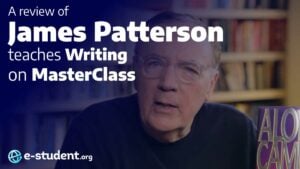I must confess that I didn’t know much about Michael before taking this masterclass. While I had heard of his book, ”The Cooking Gene,” I hadn’t yet found the time to read it. So, why did I enroll in this masterclass knowing so little about the instructor when there are numerous cooking classes available on the MasterClass platform, some of them featuring recognized chefs like Gordon Ramsay or Apollonia Poilâne? What sets this class apart?
Well, upon glancing at the trailer and the class guide, I was immediately hooked by the topics this Masterclass promised to deliver. The mere idea of learning more about African history and Southern cuisine while exploring the narratives behind each recipe and understanding the intricate threads that connect my family’s past to my present made this class stand out from many others. Michael W. Twitty captivated me with his genuine energy and passion for intertwining history, identity, and culture within the art of cooking.
But is this masterclass truly worth the investment, especially for those who, like me, value the essence of preserving heritage through food? Does this Masterclass have a profound impact on reshaping how we perceive our family stories and the meals that define them?
In this review, I’ll aim to answer those questions by exploring the content’s depth and Michael’s unique teaching methods. Join me in learning to explore the roots that ground your favorite family recipes and uncover the stories embedded within them. The question of whether “Tracing Your Roots Through Food” is a worthwhile investment is about to be answered.
Table of Contents
What is the Michael W. Twitty MasterClass?
“Tracing Your Roots Through Food” is a course on MasterClass led by Michael W. Twitty, a two-time James Beard award-winning author known for his groundbreaking work in food storytelling. This immersive course comprises 18 lessons over 3 hours and 20 minutes, where you’ll learn the historical roots of African cuisine and explore the historical and ancestral ties between your family history and culinary traditions. Through engaging video lessons, you’ll discover the migrations that shaped staple Southern kitchen ingredients and learn to re-create dishes pivotal to Michael’s cultural identity.

Who is Michael W. Twitty?
Michael W. Twitty, the instructor of “Tracing Your Roots Through Food,” is an award-winning writer and speaker renowned for his expertise in food history. His groundbreaking book, “The Cooking Gene,” explores the impact of enslaved Africans on Southern American cuisine, earning him two James Beard awards. His commitment extends to immersive experiences, including working in Southern plantation fields to fully understand the roots of African American food.
Who is the target audience of Michael W. Twitty's MasterClass?
This course is ideal for those passionate about exploring the intersections of food, history, and personal heritage. Whether you’re a culinary enthusiast, a history buff, or someone eager to connect with your roots, “Tracing Your Roots Through Food” is the course you’re looking for.
There are no prerequisites, but having read Twitty’s book “The Cooking Gene” certainly enhances the experience. But don’t worry; this course welcomes anyone curious about understanding history through the lens of culinary traditions.
What does Michael W. Twitty's MasterClass cover?
Here is a glimpse of the amazing content awaiting you in this MasterClass:
- Meet Your Instructor: Michael W. Twitty introduces the significance of preserving family food history and shares insights from his book, “The Cooking Gene.”
- Ancestral Foodways – Keeping Recipes Alive: Michael guides you on engaging with family in the kitchen, chronicling food pathways.
- Tracing Ancestral Foodsteps: An overview of how migratory patterns helped shape contemporary Southern food.
- Case Study – The Cooking Gene: A behind-the-scenes look at Michael’s process for discovering culinary roots and the creation of his book.
- Foodways of the Transatlantic Slave Trade: Dive into African American culinary history during the transatlantic slave trade.
- Food Culture of the Antebellum South: Michael pulls from his experience as a historical interpreter and historian to teach about life in the antebellum South as it relates to food.
- The Birth of Soul Food: Learn the rise of contemporary soul food and the migratory patterns influencing Southern cuisine.
- Taking Inspiration From Master Chefs: Michael introduces critical figures in African American cuisine, including Edna Lewis and James Hemings.
- Africa’s Culinary Contributions: Trace well-known dishes back to Africa and explore the cultural roots of “Southern hospitality.”
- The Mosaic of Genealogy: Explore DNA stories and the importance of speculative and genetic genealogy in understanding your family history.
- Deciphering Your DNA Story: Address the pros and cons of DNA testing in researching your family history.
- Food Storytelling: Michael shares his step-by-step process for food writing, delving into the deep meaning and history behind dishes.
- Food Blogging with Purpose: Explore how personal purpose can shape one’s voice in the blogosphere, using Michael’s blog Afroculinaria as an example.
- Facing Your Pain: Learn the complexities of researching your family history, as well as how to confront the painful parts of the past.
- Culinary Justice: Explore cultural appropriation and environmental racism within the culinary landscape.
- Okra, Corn & Tomato Stew: Prepare a symbolic “Stewp” while learning about the cultural significance of vegetables in Southern cuisine.
- Accara – Black-Eyed Pea Fritters: Make “West Africa’s answer to falafel” and learn the cultural roots of black-eyed peas.
- Our Narratives Connect Us: Understand the intersection of traditions and foodways, as well as the importance of preserving food experiences for future generations.
My favorite parts of Michael W. Twitty’s MasterClass
Be present and ask questions

This lesson resonated with me because, in this day and age, we tend to be so distracted by the digital world that we hardly pay attention to our surroundings or take the time to engage in meaningful conversations or moments with those around us. And food can be a way to share some of these moments.
To make sure the recipes in your family don’t die, Michael suggests going to your elders and being present. Truly be present, and please follow Michael’s advice and do not stick a smartphone in their face.
Go in there with open ears, open stomach, and open eyes.
Michael W. Twitty
Make sure to be present because when we use our technology, we understand that it can be revisited if it’s properly recorded, so we don’t take the time to be present and in the moment, and that’s not what you want to do. You want to learn; you want to know how the recipes are made. So really be present and be observant. Help make the recipes, engage in the process, and ask questions.
Why is a dish prepared a certain way? Why is a recipe only made during a certain time of the year? Go to the eldest people who can tell you the stories that answer your questions. By doing this, you can gain a deeper understanding of your family traditions and understand how they connect to your past and present.
Share your passion with the world, and don’t be afraid to write terribly

In this inspiring lesson, Michael helps you overcome the fear of sharing your findings with the world. This can be a daunting task given the huge amount of content that’s already available on the web, but you have to understand that, as Michael says, you don’t have to have a fancy kitchen or be a trained chef to write about food or to work with food. All that matters is having a passion for sharing your experiences with the wider world.
Don’t be afraid to write terribly. Your writing doesn’t have to be great.
It isn’t about happy endings or happy stories; it’s about stories that move you but, more importantly, stories that move others.
Michael W. Twitty
You have to be willing to be wrong, to make mistakes, and to write terribly.
Cook with your senses

This lesson completely transformed my approach to cooking. I am accustomed to measuring everything in grams, and the mere suggestion of relying on my senses was very daunting. However, embracing this approach taught me to be more flexible and fully present in my cooking, and it made a significant difference! It also helped me understand more about my family, as I realized this was precisely how my grandparents learned to cook. It’s true—what if you lacked the tools to measure anything precisely?
This experience deepened my bond with family and the recipes I prepared. I thoroughly enjoyed this lesson, even though I admit it was challenging.
You have to learn how to cook with your feelings, with your intuition, and your wisdom.
Michael W. Twitty
Preserve and protect your stories

For me, this is the greatest lesson you can learn by taking this masterclass and the main reason Michael embarked on the process of starting his blog and writing his book. You want to make sure you don’t lose your family traditions and the culinary heritage that has been passed down to you.
Don’t underestimate the power of keeping your traditions alive: start gathering pictures, conversations, and recipes. Start creating something that you can pass down and, most importantly, document your findings. Words you heard, traditions that you didn’t always understand but that always intrigued you. Write down everything you remember, record it if necessary, and upload it to a cloud.
Take the precautions to make sure it doesn’t die, and you’ll make sure it’s eternal.
Michael W. Twitty
How much does the MasterClass cost?
MasterClass is a subscription-based learning platform, so it’s not possible to purchase courses individually. If you want to take this MasterClass, you have to become a subscriber.
The standard annual plan has been renamed "Plus" and is available at $120 a year (which makes it $10 per month, billed annually), and now provides access to all MasterClass courses on two devices instead of one. The Premium plan, providing access for up to six devices costs $240 per year.
A MasterClass subscription gives you unlimited access to a catalog of 200+ classes, so if you want to take multiple classes throughout the year, the subscription is definitely worth it, and there are pleny of interesting courses on related topics to explore.
Also, the platform offers a 30-day satisfaction guarantee, so if you’re not happy with your learning experience, you can request a full refund.
Note that the "Standard" membership, priced at $72 per year, only gives you access to their short-form learning content – none of their full MasterClasses are included.
What I liked about Michael W. Twitty’s MasterClass
- Engaging and passionate teaching: Michael W. Twitty’s infectious energy and passion create an engaging learning atmosphere. His genuine commitment to sharing knowledge makes the class highly informative and enjoyable.
- Comprehensive class guide: The course provides a detailed class guide that serves as a companion to the video lessons. It includes many practical exercises and more detailed information about the topics taught in the class, allowing you to better understand the roots of Southern cooking.
- Practical assignments for family food writing: I loved the practical assignments included in the class. These assignments serve as a guide to initiate your family food writing journey, filled with valuable tips on where to start, whom to ask, and how to compile a meaningful story.
- In-depth exploration of delicate topics: Michael adeptly navigates delicate topics such as slavery and cultural appropriation thoroughly and objectively, acknowledging historical facts while promoting a forward-looking perspective.
- Deep explanations of culinary choices: Michael’s approach to explaining the “whys” behind the recipes he teaches is fascinating. Understanding the historical context and the significance of the ingredients and utensils he uses creates a meaningful cooking experience.
- Application to personal history: The course seamlessly intertwines genealogy, history, and culinary traditions, making the knowledge universally applicable. Michael inspires you to connect with your family history, regardless of your roots or background.
Drawbacks of Michael W. Twitty’s MasterClass
- Sensitive topics: While not a dislike, it’s important to note that the course covers sensitive topics such as slavery and abuse, which may be triggering for some learners.
- Challenges in cooking by senses: Michael advocates for cooking by senses, which, while a unique approach, might be challenging for those who prefer a more structured and rigid cooking style with specific times and measurements.
Review conclusion: Is Michael W. Twitty’s MasterClass worth it?
I might be a little biased because of my love for cooking and history, but this course is truly one of the best I’ve ever taken on any topic. It goes beyond a mere cooking class; you learn about culture, history, recipes, and ingredients. I learned extensively in each lesson, stepping out of my comfort zone to explore my culinary history and understand recipes that shaped my life and those of my ancestors. I had a lot of fun and learned to honor my roots in ways I hadn’t imagined before.
By asking the right questions, I have been able to explore various practices and traditions from my own history, thanks to my family. I would’ve never imagined that connecting over food, something that many underestimate, would bring us closer, and I cherished every second of it.
Through learning, experimenting, and enjoying the process, I realized our fortune in being part of something communal. Exploring the roots of African American culture was very interesting and expanded my understanding of how we can connect with people from diverse cultures just by sharing foods and traditions. This masterclass was an amazing opportunity that I thoroughly enjoyed, and I wholeheartedly recommend it to everyone.
In conclusion, I can confidently say that “Tracing Your Roots Through Food” is one of the most valuable cooking classes you can take; it’s an experience that fuels your passion and empowers you to bring your family’s history to life through writing and cooking. Whether you have a passion for cooking and history or not, this masterclass has something valuable to offer to you. It gives you a deeper understanding of history, justice, and the importance of honoring your roots and those around you. It provides a fresh perspective on aspects we often take for granted, encouraging you to open your eyes and senses to different viewpoints and appreciate the little things that make your culinary history unique.
By enrolling in this class, you are opening yourself to the opportunity to honor your roots and learn the richness of your family’s history through the art of cooking.
Are you ready to discover the narratives that lie within your recipes? Enroll in Michael’s class, and start tracing your roots through food!
For a limited time, up to 50% off your subscription.




